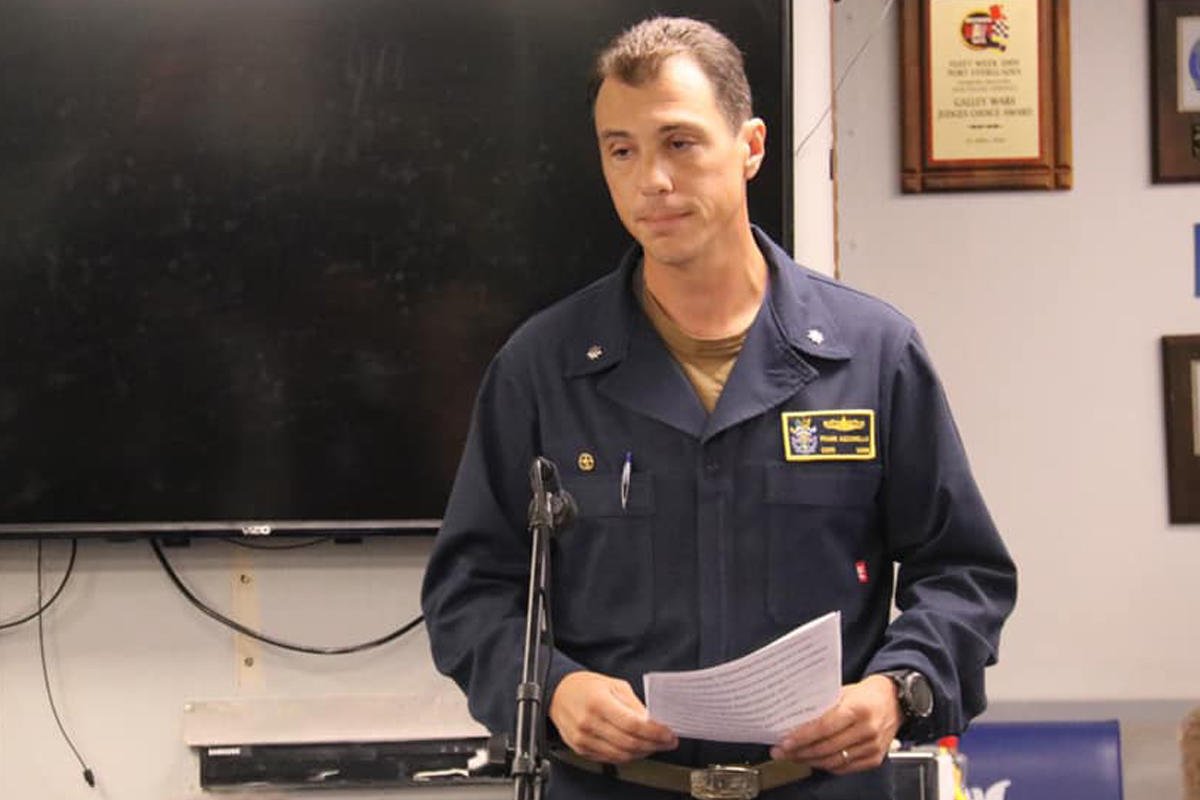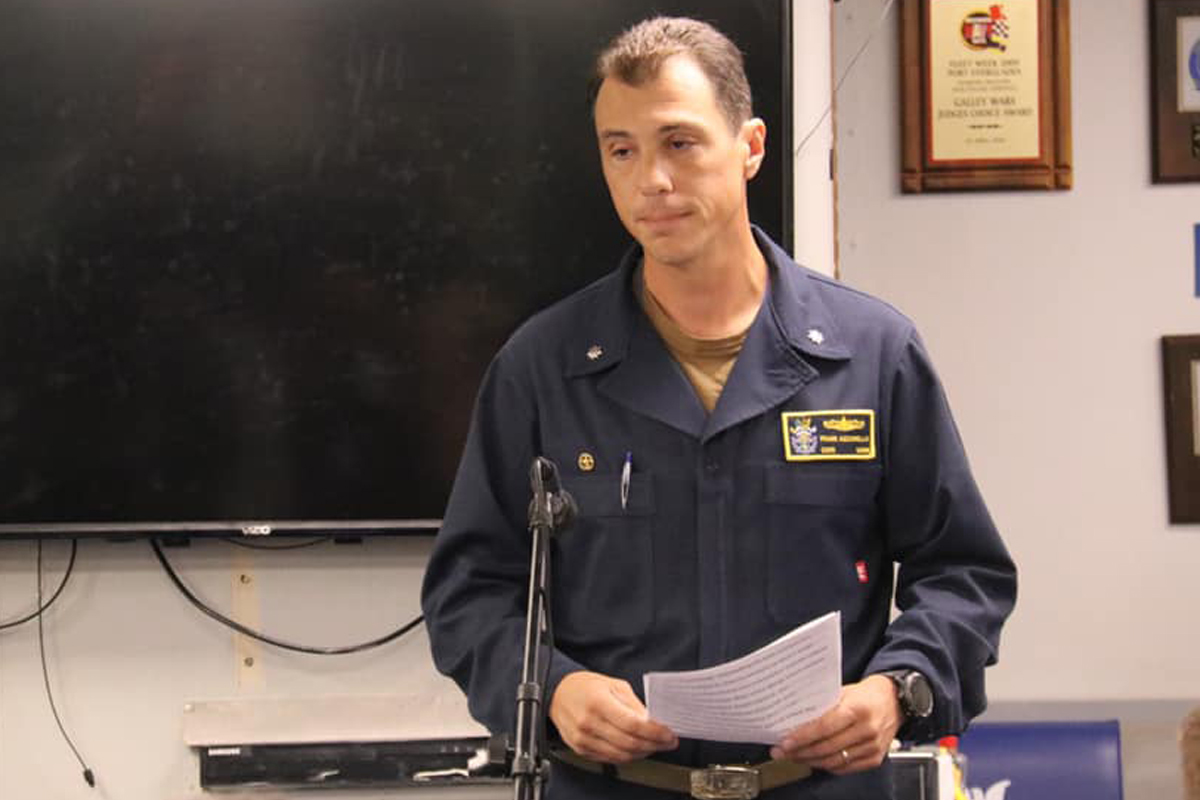

When Cmdr. Frank Azzarello was removed from his post on the destroyer Forrest Sherman, days before his change-of-command ceremony, the Navy said it was over a “loss of confidence in his ability to command.” His lawyer said it was over his decision to make a plaque out of an AK-47 commemorating his crew’s major weapons seizure in the Middle East.
However, a recently released command investigation report on Azzarello paints a picture of a commanding officer who regularly doled out verbal abuse, threatened to tank careers, and made racial and sexist remarks.
Prior to taking command of the Forrest Sherman in September 2019, Azzarello was a rising star who was lauded by his superiors.
Read Next: Russia Says Next Time It May Fire to Hit Intruding Warships
One fitness evaluation, provided to Military.com by Azzarello’s lawyer, Timothy Parlatore, said that he was “performing flawlessly as … Executive Officer.” His captain in 2017, Mark Oberley, wrote that Azzarello was a “brilliant leader, mentor and manager” in the same evaluation. In a later 2018 evaluation, Capt. Robert Thompson said that he had “the easiest job in the Navy because Frank Azzarello is my XO.” Both men noted that Azzarello was headed for his own command.
When Azzarello took charge of the Forrest Sherman on Sept. 4, 2019, he had only three hours before it left Virginia to escape Hurricane Dorian, Navy records released with the investigation show. The ship then deployed 10 days later.
That November, the crew of the Forrest Sherman intercepted a dhow carrying a new kind of Iranian missile. U.S. Central Command would “laud the professionalism” of the crew, and Azzarello’s boss noted that the commanding officer’s performance during the mission “was beyond comparison” in a 2020 evaluation.
It was this very seizure from which Azzarello would take the AK-47 that he later used to make a plaque.
However, in July 2020, the Navy Inspector General received its first complaint about the climate aboard the Forrest Sherman. A second one followed in November.
Investigators acknowledged in a letter to Azzarello’s superiors that “because the IG used an incorrect email address, [the first complaint] was not properly referred … for action” until the second one came in.
The released investigation documents show that investigators were able to corroborate “multiple specific allegations” from the July complaint by Dec. 14, 2020.
In written statements provided to investigators, officers reported being called “useless,” “stupid” and “retards.” One officer recalled being told to “get your hands out of your pockets when you speak to me, you son of a bitch.”
Azzarello did not recall many of these allegations when speaking to investigators. His lawyer Parlatore, a former naval officer who attended Surface Warfare Officer school with Azzarello, didn’t deny that he used “rough language,” but noted that it was more common when he was a young officer.
“When I was a junior officer, my captain used to call us a——s all the time,” Parlatore explained.
Reports and allegations within the report suggest that Azzarello had trouble controlling his anger and his personality could swing dramatically.
“Some people get it worse than others on the ship or just because of his mood that day,” one officer wrote to investigators.
“One second he may be asking about your family and the next he will be telling you he hates sound of your voice, that you’re f—ing retarded, or threating [a Letter of Instruction],” another wrote.
Several officers detailed an incident to investigators in which the ship’s Morale, Welfare and Recreation officer told Azzarello that there was not enough beer for the ship’s beer day because 18-year-olds were now allowed to drink at sea.
“The bridge team, including myself, thought the CO was going to hit her,” one officer wrote. “It looked like he was winding up.”
The investigation also reviewed a 2018 incident when Azzarello was the XO of the cruiser Vella Gulf. The complaint alleges that he “repeatedly poked” a junior officer “in the collarbone area while alone in his cabin following an issue” over maintenance. Azzarello also berated a chief petty officer from the same division.
“When we were dismissed [the chief petty officer] and I went to the focsle and talked,” the officer wrote in a statement to investigators. “[The chief petty officer] was in tears and said he wanted to get off the ship and hated his job.”
Thompson, who was Azzarello’s CO at the time, told investigators that he once spoke to his XO about his “passion bordering on anger,” but didn’t recall the specific incident.
One officer, whom Azzarello detached for cause in June 2020, said his behavior “gives SWOs a bad name” and described him as “Holly Graf like.”
Capt. Holly Graf was one the Navy’s most well-known toxic leaders. As commanding officer of the cruiser Cowpens, she was relieved in 2010 for allegedly demeaning and humiliating crew members, exploding with fury and aiming a seemingly bottomless trough of expletives in tirades at subordinates.
Another major finding of the investigation revealed that Azzarello “excessively” used Letters of Instruction, or LOIs — documents normally used to inform an officer of shortcomings while offering a path for improvement. He wrote at least 46 such letters for 22 officers, sometimes “in rapid succession” to a single officer. The report suggested that the practice “created an unnecessary level of mistrust and fear in portions of his wardroom, contributing to an undesirable hostile environment.”
One officer told investigators that Azzarello wrote him about 10 LOIs and threatened to fire him on numerous occasions in the 13 months the two served together. Another told investigators that Azzarello told her he “would use that [LOI] to kick me out of the Navy.”
Investigators reported that 15 LOIs were made into applications to “detach for cause,” or letters removing surface warfare officers from the community.
The report notes that one department head was detached for cause after being “issued five LOIs over a ten-week period.”
Parlatore noted that “the investigator went through [all the LOIs Azzarello wrote] and was unable to identify a single one that was inaccurate or excessive.” However, he did concede that Azzarello could have combined some of the letters.
The lawyer also argued that Azzarello was set up for trouble by the Navy.
“He got shoved into this command where every other destroyer commander has had 18 months of turnover — he has four hours,” Parlatore said.
In his 90-day command assessment, Azzarello wrote to his superiors that the ship “let training and standard slip in almost every other area” except air warfare — the role the ship historically played in the strike group.
“I assess my overall training and proficiency of my crew as average to slightly below average,” he wrote.
The letter also described a long list of empty billets in senior enlisted positions and a ship with questionable materiel readiness even as it was underway on its second deployment in a year.
Ultimately, Azzarello’s boss, the commander of Destroyer Squadron 28, agreed with the findings and recommendations of the IG investigation on Jan. 26. He was removed from command the next day.
At the admiral’s mast, which was held April 14, Azzarello faced two charges stemming from the AK-47 plaque and one charge of conduct unbecoming an officer from the allegations made by his crew, Parlatore said.
Azzarello pled guilty to the two weapon-related charges, telling the admiral that his “failure was in not contacting the [staff judge advocate] for guidance,” according to a copy of his prepared remarks given to Military.com by Parlatore.
However, he argued that his treatment of the crew came from his own experience responding to the collision of the destroyer Porter, as well as being a division officer instructor in the wake of the collisions of the Fitzgerald and McCain.
“All of these sobering experiences drove my strict compliance to established procedures on the bridge,” he said in his statement.
“In the face of every single one of these junior officers, he saw the substantial risk that he was going to have to write 20 letters to parents apologizing for the loss of their loved one,” Parlatore added.
Azzarello did not apologize for the language or behavior he displayed with his crew, however. Instead, he admitted that he could be “passionate, intense, aggressive, sarcastic, direct, and sometimes use colorful language.”
Parlatore said that Azzarello was found guilty of all three charges at the admiral’s mast and had a punitive letter placed in his record. He was not detached for cause. Parlatore said that “the admiral recommended that he not have to show cause for retention at a board of inquiry” and that he was allowed to execute new orders.
Cmdr. Ashley Hockycko, a spokesperson for the commander of U.S. 2nd Fleet, told Military.com that Azzarello has been temporarily reassigned to the staff of Naval Surface Force Atlantic.
“His performance as commanding officer will be considered along with his entire record of service when making decisions on any future assignments,” she added.
— Konstantin Toropin can be reached at [email protected].
Related: Navy Destroyer Fired After Trying to Make His Crew a Plaque with Seized AK-47
© Copyright 2021 Military.com. All rights reserved. This material may not be published, broadcast, rewritten or redistributed.
